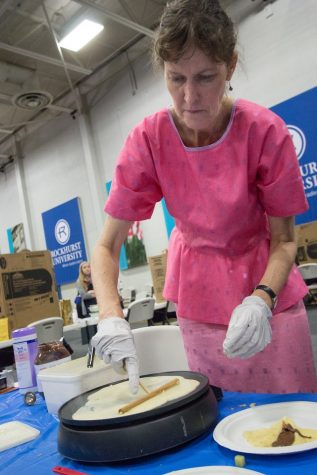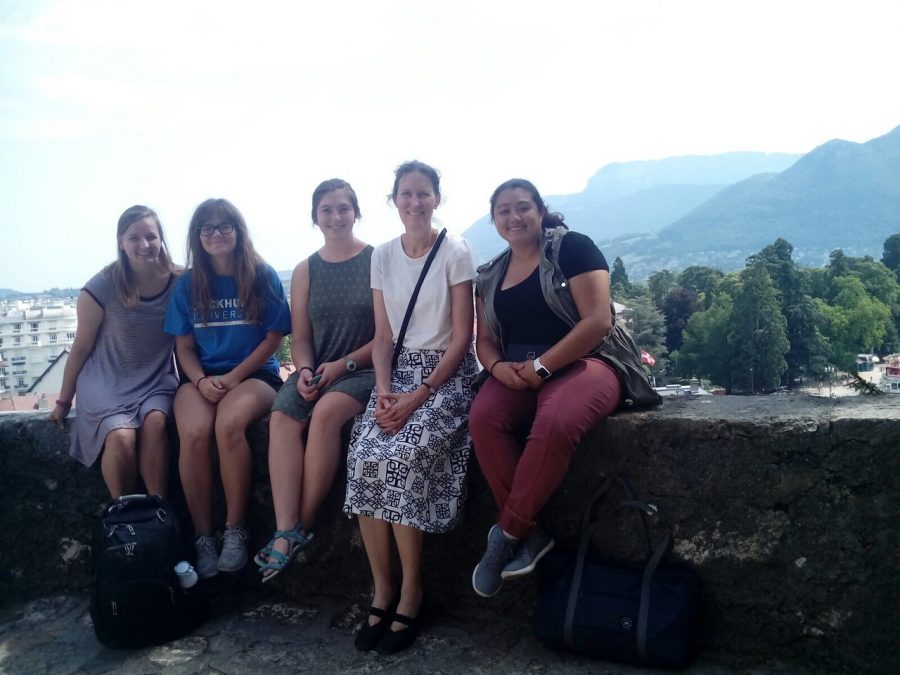Career Spotlight with Dr. M. Kathleen Madigan: Cultural immersion
November 19, 2020
Editor’s note: Dr. M. Kathleen Madigan, literature, language, and culture expert, discusses the impact cultural immersion has had on her career. This interview is a part of a series called “Career Spotlight,” highlighting the amazing professors at Rockhurst and discussing their career paths.
What first sparked your interest in studying languages?
In my first semester of college, I was not planning to major in languages, but took a required language course. That French conversation class, along with other classics and literature courses, made me realize how much more meaning was available to me through languages, and how much truly is lost from the original in the translation of literature, especially poetry. So I began studying German and opted for Comparative Literature, in addition to French and English majors. Much earlier in life, the seed was probably planted by my father, a chemical engineer, who had studied classical languages at Jesuit schools and loved words. He played word games with us at the dinner table. It was not until graduate school, though, that I studied some Greek, and returned to that same table to decline a Greek verb with him, to his surprise and delight.
What interested you the most about the French & francophone culture?
Once I was able to read some of the great authors in French, such as Hugo and Molière, there was no turning back, and that led to study abroad, which in turn immersed me in culture and friendships, and that kept expanding as well. The French-speaking world is fascinating and diverse, including Belgium and Monaco, northern and western Africa, Martinique and Guadeloupe in the Caribbean, and Quebec, so close to us.
How many other places have you lived?
I’ve taught in France and Senegal (Africa) for academic years, and lived in Germany also for an academic year while doing dissertation research. While working on an M.A. in Spanish languages and civilization, I spent several summers in Salamanca and Madrid. A Goethe Institute scholarship brought me back to southern Germany, and a fellowship from the French Embassy allowed me to spend a summer in Martinique in a seminar for French professors.
Out of all the countries you’ve spent time in, which has been your favorite?
I’ve truly loved them all, including Mexico, which I visited through study abroad, Central and South America with service trips and conferences, and Haiti for a diocesan parish twinning trip and volunteer at opportunity at Mother Teresa’s Home for Malnourished Children in Port-au-Prince. I left part of my heart there, but my parish where I was at the time took up the exchange, made it part of their mission and the school children have continued to donate school supplies annually. I still hope for a service trip there one day. I am not originally from Kansas City, but I enjoy the cultural events here as well.
What cultural experience has impacted you the most?
As a Fulbright in Dakar, Senegal, a predominantly Muslim country, I was very moved by the tolerance and kind gestures between Muslims and Christians. Muslim friends invited me to their homes and over meals would take turns keeping me company as they were called to prayer; a colleague brought me lamb and a blessing during their sacred days. At Easter, the Muslims would ask Christian friends when they would be bringing the ngalax, a delicious traditional dish with a long spiritual history. I write about these traditions, as well as collaboration with writers there in a journal I published about this.
What experience influenced your career choice the most? 
Like my choice of majors, this was gradual. I started a playschool in my neighborhood one summer when I was about nine, and it received wonderful support. Also, I recall seeing a film about St. Thomas More in which he encouraged another to “choose the quiet life.” If it is not always quiet, I realized more how influential teachers can be. Finally, in graduate school, my studies in Comparative Literature included a lot of theory and literary criticism, and teaching grounded me. I loved the personal interaction, and was encouraged, so that confirmed it for me.
How many years have you been a professor for?
I started teaching right after college graduation with summer training, then my own classes in the fall, so though most of my students were traditional age, I did have some in pharmacy school, etc., who were older than me that first year. I taught throughout most of graduate school, and I’ve taught for several decades full-time since then.
What is your favorite part of your career?
The students and my field. I’ve enjoyed the ever-expanding nature of it, and I’m never bored with it. I’m truly sharing my passion: language, literature, creative writing, film, women’s studies, culture, etc.
Have you taught or worked in other places?
In addition to teaching in graduate school, as well as in Africa and France, I taught French and German full-time for over a decade at a university in the foothills of the Appalachian Mountains, another beautiful place and culture. We were able to hike parts of the Appalachian trail on Sunday afternoons. There I learned some clogging, as well as Irish step dance, and enjoyed the view of the mountains from campus.
If so, what place gave you the most academic or professional growth?
The University of North Carolina at Chapel Hill offered wonderful opportunities, and it was through joint programs that I was able to teach in France (Montpellier) and work on my dissertation in Germany. But the most growth came as a Fulbright in Africa, and Rockhurst University allowed me to do that.
What are the biggest challenges you’ve encountered in your career?
With opportunity comes challenge, and that year in Africa was not always easy. I did not know any of the writers with whom I collaborated before going there, and in fact, I didn’t know anyone there. Finding material resources for my classes and research was a challenge, despite shipping boxes of supplies to Dakar in advance. But the Fulbright Program allowed me to buy an overhead projector for my department, which is what they wanted at the time, and the American Embassy and Center there also helped. Resourcefulness meant making friends, inviting writers to a meal, building collaborations, and making a lesson plan out of a cassette tape and a player you hoped would work on the day needed. But in the end, it was very rewarding, and now I have stories for students, which is why I went in the first place.
Have you encountered any challenges as a woman in your career?
Yes. At times, to be fair, being in a minority may have been an advantage. But I did face many challenges in putting together the collection of stories about inspiring women in Senegal. I had a bank sponsor lined up who pulled out once the subject—honoring woman and their career advances—was understood, as well as a difficult experience with a potential to be published. It was two former women mentors from my undergraduate days who inspired me not to give up, simply by giving me other ideas of how to get it published, which it eventually was. And though it was given an excellent review by a colleague from an American university whom I do not know, perhaps given the combination of a woman editor, stories about inspiring woman, and in a foreign language, it was not selected for a monetary prize for scholarship; I had hoped to give that to the writers to increase their income. But in the same breath, I have to thank the innumerable colleagues, male and female, who have supported me all along the way.
What is an “ah-ha” moment you’ve had throughout the years, where your cultural and linguistic knowledge was experienced firsthand?
These continue to happen. But a “regional” one would be in the mountains of Tennessee, when I was called in to translate for a Haitian woman with a medical problem; the doctor was donating his services to this family of political refugees for free, but he needed to know what she was saying and feeling. Afterwards, her relief was tangible and came quickly, and we became friends. Another very practical, yet “moving” example was in Senegal, when I had to learn some Wolof in order to avoid a sort of “highway robbery” exercised by some taxi drivers on foreign tourists. One bargains for nearly everything there, and before getting into a taxi, a price has to be agreed upon. The embassy took pains to explain to us that foreigners who could afford to take a taxi should do so, rather than crowd public transportation further. So I went to class weekly and learned enough to give the traditional greeting, say that I was going to the École normale (training school for future teachers and current teachers wanting to become school directors), and state what I was willing to pray. The first time I tried it, the driver listened, I held my breath, then he motioned for me to get in. In other words, he accepted the amount. That happened for the rest of the year, with hundreds of drivers. They were astonished that someone would make the effort to learn even a bit of the “street and market language”, and when they heard where I was going, they knew I was trying to help. Language and destination literally opened doors.
If you could give your younger self one piece of advice, what would it be?
With Edith Piaf, I would have to say that in terms of my career choice, “Je ne regrette rien.” Retrospectively, some of the richest adventures I’ve had were the ones that I hesitated about, at least momentarily, including that stay in Africa. So rather than give advice, I’d rather end by thanking all those again who have been part of this wonderful journey, especially those who encouraged me to branch out.
Edited by Amarvir Ghuman


